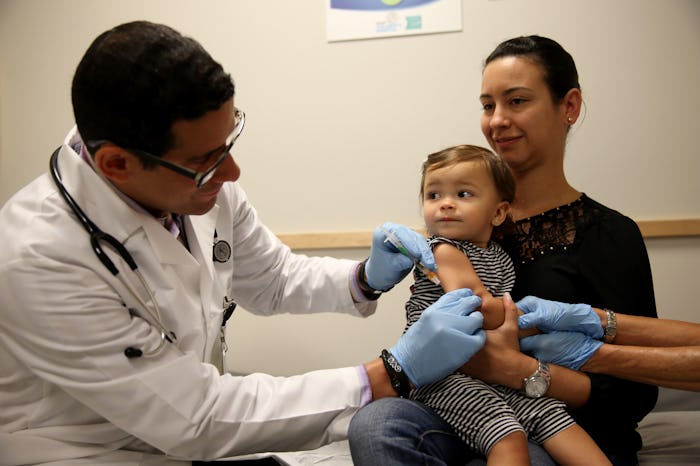Life

Here's How Doctors Treat The Measles
According to a recent report from CNN, there are at least 107 confirmed cases of the measles across 21 states. So it's completely understandable that any parent, regardless of where they live or whether or not they've followed Centers for Disease Control (CDC) and World Health Organization (WHO) guidelines and vaccinated their children, would worry about their children contracting the measles. So, how do you treat the measles if the worst happens and your child ends up sick? While vaccinating your child will protect them from the completely preventable disease, it's worth knowing your treatment options... regardless.
Unfortunately, if your child gets the measles there’s not a lot you can do. According to the CDC if you suspect your child has the measles you should absolutely call their doctor right away. The measles can be serious, and one out of four people who contract the disease require a hospital stay in order to be treated. The measles can also result in dangerous complications like pneumonia and encephalitis. Additionally, the American Academy of Pediatrics (AAP) notes that your local health department will need to know your child has the measles so they can help stop the spread of the disease.
The measles can’t be cured, so you can't treat the disease itself, but doctors can treat symptoms like pain, fever, or dehydration, and sometimes, according to the Mayo Clinic, parents can treat the same symptoms at home. According to the same site, if you're exposed to the disease you might be able to prevent getting the measles or lessen its symptoms if you get help right away.
While measles was once a common and tragically deadly childhood illness, the CDC reports that the disease was declared eliminated in the United States in 2000, thanks to the measles, mumps, and rubella vaccine (MMR). Unfortunately, the same site reports that a combination of factors including vaccination rates under 90 percent in some communities, and unvaccinated people traveling to places where the disease is common, have allowed the measles to make a very unwanted comeback.
Unfortunately, as the Mayo Clinic reports, the measles is a highly contagious disease. The same site notes that the virus hangs out in an infected person’s throat and nose and is spread when they cough, talk, or sneeze. Unvaccinated people who are exposed to the illness have about a 90 percent chance of contracting the virus. To make matters worse, people are contagious up to five days before the onset of symptoms, which can make it even easier for the disease to spread.
If you suspect that your child has the measles, the AAP recommends that you call their doctor right away and follow their instructions about where to take your child and how to get treatment.
In the meantime, Mayo Clinic recommends keeping your child comfortable and hydrated. You can treat symptoms like a high fever, sore throat, or body aches with over-the-counter ibuprofen or acetaminophen, but you should report more severe symptoms like a headache or fever that won’t come down to your child’s doctor, as they may require a hospital stay. No matter how severe your child’s case of the measles seems, the AAP advises keeping them home for at least four days after their rash appears to prevent exposing others, especially young children and immunocompromised people who can't be vaccinated.
When it comes to the measles, the old adage "an ounce of prevention is worth a pound of cure" is totally true. The CDC reports that two doses of the MMR vaccine (usually given between 12 and 15 months of age, and again between 4 and 6 years) will prevent the measles infection in 97 percent of people. And while there’s no cure for the measles, the Mayo Clinic notes that an unvaccinated person who is exposed can prevent the measles by getting vaccinated within 72 hours of exposure or receiving a dose of antibodies called immune serum globulin. Another option to reduce the duration and severity of the disease is a high dose of vitamin A, as kids with a vitamin A deficiency tend to have worse cases of the measles.
Bottom line, if you suspect your child has the measles you should call your doctor right away. In the meantime, the best thing you can do is vaccinate your kids and make sure you are up-to-date with your vaccines, too.